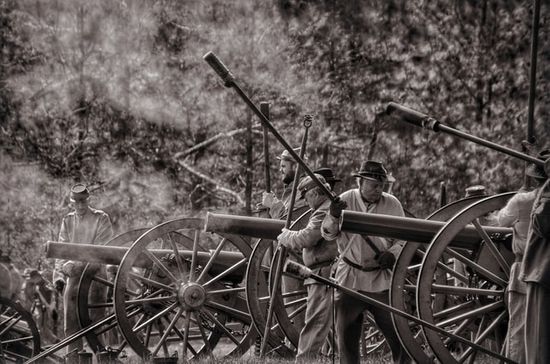William Miller: Reviving the Hope of the Second Coming
William Miller was a farmer in the early 1800s who gave his life to God and began studying his Bible deeply. This study led him to some unexpected conclusions, namely that Jesus would come back to earth in his lifetime—in 1843 or 1844. As Miller began sharing this news, he sparked a religious revival in North America called the Millerite Movement.
So, who was Miller, and what led him to this conclusion? We’re here to answer that question and more:
- William Miller’s background
- William Miller and the Millerite Movement
- William Miller’s life after Jesus didn’t return
- William Miller’s connection to the Seventh-day Adventist Church
William Miller’s background
William Miller was born in Pittsfield, Massachusetts, in 1782. He was the first of William and Paulina Miller’s 17 children. Soon after his birth, the family moved to Low Hampton, New York.
Miller’s father, who had served as a captain in the Revolutionary War, was not very religious. His wife, though, was a devout Baptist, whose prayers were not lost on her eldest son. 1
 As a child, Miller showed intellectual promise and curiosity. As soon as he learned to read, he began to do so every night with books borrowed from neighbors. 2
As a child, Miller showed intellectual promise and curiosity. As soon as he learned to read, he began to do so every night with books borrowed from neighbors. 2
William Miller’s marriage and occupation 3
In 1803, William Miller married Lucy Smith, with whom he had five children. He carried on with farming and became involved in the civil matters of his community, serving as constable, deputy sheriff, and justice of the peace.
Despite his busy life, he found time for his favorite pastime—reading. His curiosity sparked some questions about his beliefs.
Becoming a deist 4
After their marriage, the Millers settled in Poultney, Vermont, where Miller became acquainted with deists. Deists believed in God but rejected the Bible and viewed Him as a distant deity that left the world to run on its own. This kind of God did not have any personal involvement with His created beings.
 Miller had always wondered about connecting some perplexing passages in the Bible and had never received solid answers from preachers. If the Bible didn’t have answers, perhaps deism was the solution.
Miller had always wondered about connecting some perplexing passages in the Bible and had never received solid answers from preachers. If the Bible didn’t have answers, perhaps deism was the solution.
He began reading books by deistic philosophers, but his mind was not at ease. He struggled with what they believed about the afterlife—that humans cease to exist.
Questions of eternity and death became even more real when he faced the horrors of battle.
Returning to Christianity 5
William Miller became a captain in the army during the War of 1812 between the United States and Great Britain. His experiences during that time led him back to Christianity and belief in a personal God.
While he served in the war, the Americans experienced a miraculous victory at the Battle of Plattsburgh. 6 They were far outnumbered and should have lost, yet they didn’t. In the same battle, a shell exploded near Miller, barely missing him.
After the war, he thought about how his life had been saved.
Was it possible that God took a personal interest in him?
Moving back to Low Hampton, New York, Miller began attending the Baptist Church—but only when his uncle, the minister of the church, gave the Sunday sermon. When his mother asked him why he didn’t come at other times, he complained about the way the deacons read the sermons.
“When Uncle’s away, Mother, why don’t they let me read it?”
His mother took his words to heart, and the next time his uncle was away, Miller did read the sermon.
It was during one of these sermons that conviction pierced his heart so strongly that he could not finish. That day in 1816, he realized his need for a Savior. He began to spend time reading the Bible to know this personal God.
Here’s how he puts it:
“When [I was] brought almost to despair, God by his Holy Spirit opened my eyes. I saw Jesus as a friend, and my only help…. and the Scriptures, which before were dark and contradictory, now became the lamp to my feet and light to my path.” 7
“But how do you know the Bible is the Word of God?” his deist friends challenged him. This question caused him to turn to the Word of God and discover a prophecy that would lead to a worldwide religious movement.
William Miller and the Millerite Movement
William Miller’s deep-dive into the Bible led him to prophecies about the Second Coming. The more he studied, the more he became convinced that Jesus was coming soon—in fact, in 1843 or 1844. As he shared this with others, a religious revival, known as the Millerite Movement, swept across the country.
What exactly did Miller uncover?
The 2,300-day prophecy 8
Miller had begun his Bible study to respond to the challenge of his deist friends. He decided he would study verse by verse, using the margin of his Bible and a concordance to find cross-referenced verses. Eventually, he uncovered a prophecy in Daniel 8:14 that seemed to point to Jesus’ second coming and the judgment day:
“For two thousand three hundred days; then the sanctuary shall be cleansed” (Daniel 8:14, NKJV).
 Like other Christians of his time, he thought that the sanctuary referred to the earth. The cleansing, then, had to be its cleansing by fire when Jesus returned, as described in Revelation 21:8.
Like other Christians of his time, he thought that the sanctuary referred to the earth. The cleansing, then, had to be its cleansing by fire when Jesus returned, as described in Revelation 21:8.
Miller believed, as did many theologians before him, that a day in Bible prophecy equals one year (Numbers 14:34; Ezekiel 4:6). This meant that this prophecy was referring to 2,300 literal years.
In addition, he realized that Daniel 9 connected with Daniel 8 and provided a starting point for both prophecies: 457 BC—the time of the decree to rebuild Jerusalem.
All that remained was a math calculation. Counting 2,300 years from 457 BC, Miller came to 1844.
Could it be that Jesus was coming in less than 25 years?
Miller wasn’t sure, so he kept it to himself as he continued to study out objections.
You may be wondering:
Did he ignore plain passages in the Bible which say that no one knows the day nor the hour of Jesus’ coming (Mark 13:32)?
No, he did actually consider those passages. For this reason, he never set a definite time for the Second Coming but only said that he believed it would happen sometime in 1843 or 1844. Later on, some of Miller’s followers set the date of October 22, 1844. 9
Miller, though, was skeptical of this exact date for Jesus’ coming. It wasn’t until the beginning of October that he became convinced that October 22nd “was at a probable point of time.” He believed it was “a work of God” because of the way people were confessing their sins and earnestly searching their hearts as they waited for Jesus to come. 10
The call from God 11
After about 13 years of study, Miller was growing more convinced in his Bible studies on Daniel 8:14. He wrestled with the message God was giving him: “Go and tell the world of their danger.”
“I can’t go, Lord.” He felt inadequate to speak about the Bible in public since he had little or no theological training and was not ordained as a minister. He was just a farmer who loved to study the Bible.
But to ease conviction, he decided: “If I should have an invitation to speak publicly in any place, I will go and tell them what I find in the Bible about the Lord’s coming.”
A sense of peace came over him. He didn’t dream that anyone would actually invite him to preach!
Half an hour later, a young man knocked at the door and asked if Miller would come that Sunday and share about the Second Coming.
Keeping his promise to God, Miller accepted the invitation, and revival took place in the church. Soon another invitation came, and another. So many requests poured in that he couldn’t keep up.
Thinking to solve this problem, he published a book in 1832. 12 But this only served to increase interest.
In 1839, he partnered with Joshua V. Himes, a well-known reform leader from Boston, who began promoting his message. He also received help from Apollos Hale to create the 1843 prophecy chart that showed the Bible prophecies that ended in 1843. 13
Though he had not intended to, he had begun a religious revival, just after the tail end of the Second Great Awakening that spread across the United States and even the world. Through it all, he remained a humble Bible student and follower of Jesus.
Did William Miller claim to be a prophet?
When speaking about Jesus’ coming and the judgment day, William Miller never claimed to be a prophet. He was a genuine Christian who was sharing what he had learned through years of diligent Bible study.
Furthermore, he had no goals to build a following or convert people to a specific denomination. His motives were pure—he wanted people to be ready to meet Jesus.
He wrote:
“My whole object was a desire to convert souls to God, to notify the world of a coming judgment, and to induce my fellowmen to make that preparation of heart which will enable them to meet their God in peace. The great majority of those who were converted under my labors, united with the various existing churches.” 14
He showed a similar attitude when Jesus did not return as expected.
How did Miller respond to the Great Disappointment?
Naturally, October 22nd, 1844, was a disappointment to Miller. But he remained humble and trusted that God’s plan had not failed. It must have been human error.
On August 1, 1845, he published a document that became known as “William Miller’s Apology and Defence.” In it, he admitted that he had been mistaken about the timing of Jesus’ return.
But he expressed some confusion. Why had God seemed to be working so clearly in people’s lives right before October 22nd? Why did they experience peace and joy while waiting, if the time had been wrong? 15
 He also traced his line of reasoning and said that he could not find where his calculations were off. He believed that he had followed God’s leading and done the right thing in sharing his convictions:
He also traced his line of reasoning and said that he could not find where his calculations were off. He believed that he had followed God’s leading and done the right thing in sharing his convictions:
“I therefore still feel that it was my duty to present all the evidence that was apparent to my mind; and were I now in the same circumstances, I should be compelled to act as I have done.” 16
Miller’s Life after the Great Disappointment
Miller never spoke of a definite time for the Second Advent again, but he continued to hope for that day. 17 He formed a group of believers and supported the younger leaders in the movement until he died in 1849.
Many of his followers gave up their faith in God after the Great Disappointment, while those who didn’t split up into three main groups 18 :
- Those who believed the date was wrong but that Christ’s coming would take place soon.
- Those who believed that Christ had come in a “spiritual” sense—into people’s hearts.
- Those who believed the date was correct, but the expected event was not.
Miller was part of the first group, but it “pained [him] to see a spirit of sectarianism [a strong attachment to a religious sect] and bigotry.” 19 He was concerned that some of the people in these groups had gone to extremes in their beliefs.
For this reason, he met together with some of his followers at a conference in Albany, New York, on April 23, 1845. There they clarified their beliefs and encouraged one another. 20
But how about Seventh-day Adventists? Did he join them?
What is William Miller’s connection to Adventism?
William Miller’s earnest study of the Bible and the resulting movement was a catalyst for starting the Seventh-day Adventist Church. But he was not a founder of the Church and never became involved with it. In fact, he died many years before its organization in 1863.
See, after October 22, 1844, there was a small group of people who believed that the date had indeed been correct. The event, however, was not. Returning to their Bibles and guided by the Holy Spirit, this group realized that Jesus had moved from the Holy Place to the Most Holy Place of the sanctuary to begin a work of judgment instead.
At the same time, they were learning other truths, such as the seventh-day Sabbath. Many years later, they would form the Seventh-day Adventist Church.
But Miller would not be among their ranks since he didn’t agree with them about Jesus’ work in the sanctuary. Ellen White, one of the founders of the Adventist Church, wrote that he also didn’t accept the Bible’s truth about the Sabbath due to the influence of his fellow workers.
Nevertheless, through what he started, others further pursued the truths of the Bible.
God used Miller despite his mistake
William Miller was a true man of God who looked forward to Jesus’ return. Though mistaken about the timing of that event, he simply wanted others to be ready, and God used him in powerful ways to bring revival worldwide.
Because of the Great Disappointment, a small group of people began studying their Bibles more deeply. What they discovered led to the Seventh-day Adventist Church—a thriving Christ-centered denomination today. In this way, God took William Miller’s mistake and turned it into a blessing.
- Bliss, Sylvester, and Hale, Apollos, Memoirs of William Miller, (J.V. Himes, 1853), p. 4 [↵]
- Himes, Joshua V., Views of the Prophecies and Prophetic Chronology, Selected from Manuscripts of William Miller with a Memoir of His Life (Boston: Moses A. Dow, 1841), p. 7 [↵]
- Maxwell, C. Mervyn, Tell It to the World, (Pacific Press, Nampa, ID, 1977), p. 9 [↵]
- Miller, William, William Miller’s Apology and Defense, p. 3 [↵]
- Maxwell, p. 11 [↵]
- “The Battle of Lake Champlain,” Naval History and Heritage Command, www.history.navy.mil [↵]
- Himes, p. 7–14 [↵]
- Bliss and Hale, pp. 68–69 [↵]
- Miller, pp. 13, 24 [↵]
- Ibid., p. 25; White, James, Sketches of the Christian Life and Public Labors of William Miller, ch. 16. [↵]
- Bliss and Hale, pp. 92–99 [↵]
- The full title of the book is Evidences from Scripture and History of the Second Coming of Christ About the Year A.D. 1843, and of His Personal Reign of 1000 Years. [↵]
- Maxwell, pp. 16, 19 [↵]
- Miller, p. 23 [↵]
- Maxwell, p. 35 [↵]
- Miller, p. 33 [↵]
- White, James, Sketches of the Christian Life and Public Labors of William Miller, ch. 16 [↵]
- Douglass, Herbert, Messenger of the Lord, (Pacific Press, Nampa, Idaho, 1998), p. 134. [↵]
- Miller, p. 26 [↵]
- White, James, p. 344 [↵]
- White, Ellen, Early Writings (Review and Herald, Washington, D.C., 1882) [↵]
Questions about Adventists? Ask here!
Find answers to your questions about Seventh-day Adventists
More Answers
The Health Benefits of Fresh Air You Should Know About
The Health Benefits of Fresh Air You Should Know About“When you can’t breathe, nothing else matters,” the American Lung Association tells us. And while that’s true, the kind of air you’re breathing will determine the health benefits you experience. Breathing fresh...
What Do Seventh-day Adventists Choose to Eat?
What Do Seventh-day Adventists Choose to Eat?Food blogs overwhelm the internet; food fads are all the rage; and copycat and healthy versions of food are the subject of many a get-together. Eating—and eating the best way—is a big deal. And everybody has a different...
10 Incredible Ways Sunlight Can Improve Your Health
10 Incredible Ways Sunlight Can Improve Your HealthAre you concerned about sunlight’s negative effects? You might be the one who lathers on the sunscreen and covers up when you go outside. Or maybe you avoid being outside as much as possible. You might be surprised,...
Why Is Water So Important?
Why Is Water So Important?We all know that water is a substance we can’t live without. It quenches our thirst and keeps us hydrated on the inside. And it’s necessary for hygiene and cleansing on the outside too. But did you know that the cleansing properties of water...
Ellen White’s Writings and the Adventist Health Message
Seventh-day Adventists are known for their emphasis on healthy living. And Ellen G. White was a significant influence in the development of this priority and practice among Adventists.
Health Clinics
Ellen White and Adventist Healthcare—Ahead of Their Time Medical care in the mid-1800s was primitive, to say the least. Basic concepts we take for granted—such as proper handwashing or recognizing the dangers of bloodletting—were nonexistent. And doctors often had...
What Did Ellen White Teach about Vegetarianism?
What Did Ellen White Teach about Vegetarianism?One thing you might have heard about Seventh-day Adventists is their emphasis on a vegetarian lifestyle. If you’re wondering why that is, it goes back to our church’s humble beginnings: As Adventists studied the Bible,...
How Ellen White’s Teachings Can Improve Your Health
How Ellen White’s Teachings Can Improve Your Health Healthcare in the nineteenth century was said to leave “more disease than it took away” with its use of bloodletting and “medicines” like mercury and arsenic.1 As people questioned these methods, new approaches...
Change Your Perspective on Life with These 5 Mindsets
5 Biblical Mindsets to Change Your Life for the Better Sometimes, life is just plain hard. There’s no way around it. So would thinking about things differently really change anything? Our perspective on life, and everything it throws at us, affects more than we’re...
Bible Promises for When You’re Worried or Fearful
Bible Promises for When You’re Worried or Fearful The Bible is full of beautiful promises that can comfort us in a variety of situations. They can give us hope when we are hopeless, make us feel grateful for God’s love, and comfort us when we’re grieving or suffering....
12 Practical Ways to Overcome Worry
12 Practical Ways to Overcome Worry DISCLAIMER: This content is for informational purposes only. It does not constitute any professional medical advice and is not intended as a substitute for professional mental health therapy. It’s easy to get stuck in a cycle of...
How the Bible Talks About Worry, Fear, and Anxiety
How the Bible Talks About Worry, Fear, and Anxiety Worry and fear are the ingredients of anxiety. It’s easy to see how the world isn’t perfect—and the anticipation of a bad event or experience (that may or may not even happen) can end up draining the peace and...
How to Calm Anxious Thoughts, Using the Bible
How to Calm Anxious Thoughts, Using the Bible You were expecting a phone call from your daughter half an hour ago, and she still hasn’t called. She’s also not answering your calls. You feel your heart thumping as your thoughts race: What if she’s been in a car...
What You Should Know About the Adventist Health Studies
What You Should Know About the Adventist Health StudiesYou may have heard that Seventh-day Adventists care about health. But what you may not know is that Adventists have been the subjects of long-term research into lifestyle and health. Since 1958, researchers from...
Benefits of Sunlight
Yes, There Are Health Benefits of SunlightDespite the bad reputation it’s gotten, sunlight is generally associated with positivity, as shown by songs like “You Are My Sunshine,” or phrases that refer to delightful people as having a “sunny disposition.” There’s a...
Why Your Body Needs Rest for Optimal Health
Why Your Body Needs Rest for Optimal HealthStruggling to think straight? Wondering why you can’t remember that important tidbit you heard earlier today? Feeling like your emotions are about to explode? These are just some of the symptoms that can reveal your need for...
The Seventh-day Adventist Diet: One of Our Key Longevity Secrets
The Seventh-day Adventist Diet: One of Our Key Longevity SecretsOats, avocados, lentils, tofu—probably not what you first think of in a standard American diet. But if you show up at the home of an Adventist, chances are you may be served one of these staples. Out of a...
Why You Need Fresh Air
Why You Need Fresh Air“When you can’t breathe, nothing else matters,” the American Lung Association tells us. We couldn’t agree more! Breathing in clean air is an essential part of caring for our bodies, which God has given us. Together with other health principles,...
Sabbath Meal
Everything You Need to Know About Sabbath MealsFor Seventh-day Adventists, sharing a Sabbath meal with friends and family is one of the most special and memorable parts of the Sabbath. That’s why we want to share with you all about Sabbath meals and why they’re such a...
Adventists and Healthy Living
Adventists and Healthy LivingWhat’s the Adventist “Health Message” All About? One thing Seventh-day Adventists are known for is their emphasis on living healthy lives. Since our bodies are living temples of the Holy Spirit (1 Corinthians 6:19, 20), we strive to stay...
Water’s Importance—Physical Benefits and Spiritual Applications
Water’s Importance—Physical Benefits and Spiritual Applications We all know that water is a substance we can’t live without. Not only does it quench our thirst and keep us hydrated from the inside, but it’s necessary for hygiene and cleansing on the outside as well....
How Important is a “Day of Rest?”
How Important is a “Day of Rest?” Why God Created a Day for Downtime by Martin Casper Do you ever experience the feeling of complete overload? Do you feel like the only way you can get ahead is by slamming it 24/7? I hear these types of comments more and more...
7 Reasons Why a Day of Rest is Important
7 Reasons Why a Day of Rest is ImportantWe live in a fast-paced world. It seems as if success is measured in how much you can do in a short amount of time. (Extra points for the service or product that is available 24/7). The idea that we will be more successful if we...
How do Adventists choose what to eat?
How do Adventists choose what to eat?Every day, parents go through the ritual of getting their kids to eat what is healthy and good while trying to steer them away from what can hinder the growth of their developing bodies. Nutritionists work with their clients to...
How Can I Have a Better Marriage?
Is it possible to have a happy marriage?
How do Adventists make movie and music choices?
How do Adventists make movie and music choices?Cinema has come a long way since the first clips of motion pictures came to light in 1878. As the decades rolled on, film and music producers have created rivers of movies and albums for the masses. Today, watching movies...
Why are many Adventists Vegetarian?
Why are many Adventists Vegetarian?The diet intended for man is outlined in Genesis 1:29, “And God said, ‘See, I have given you every herb that yields seed which is on the face of all the earth, and every tree whose fruit yields seed; to you it shall be for food.’”...
Didn’t find your answer? Ask us!
We understand your concern of having questions but not knowing who to ask—we’ve felt it ourselves. When you’re ready to learn more about Adventists, send us a question! We know a thing or two about Adventists.




















